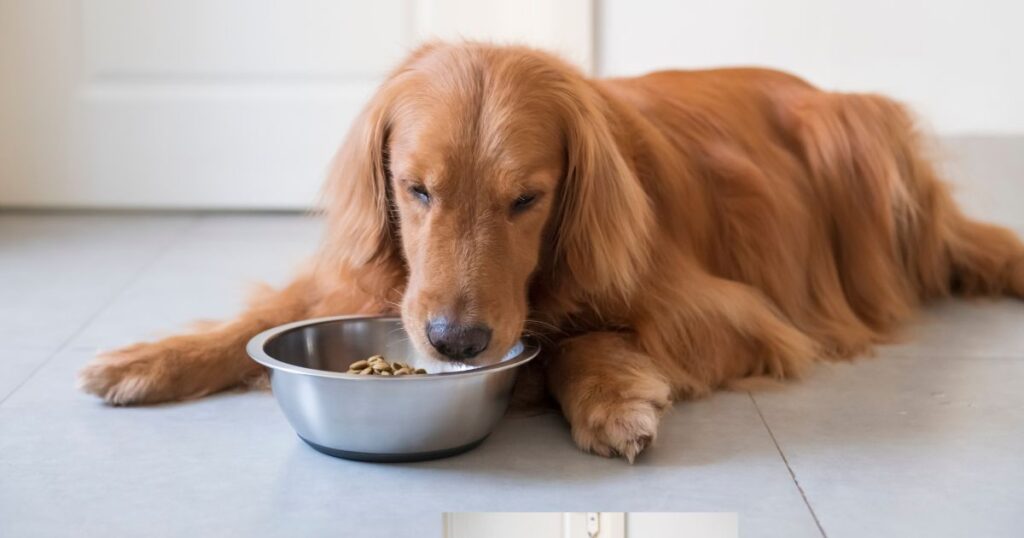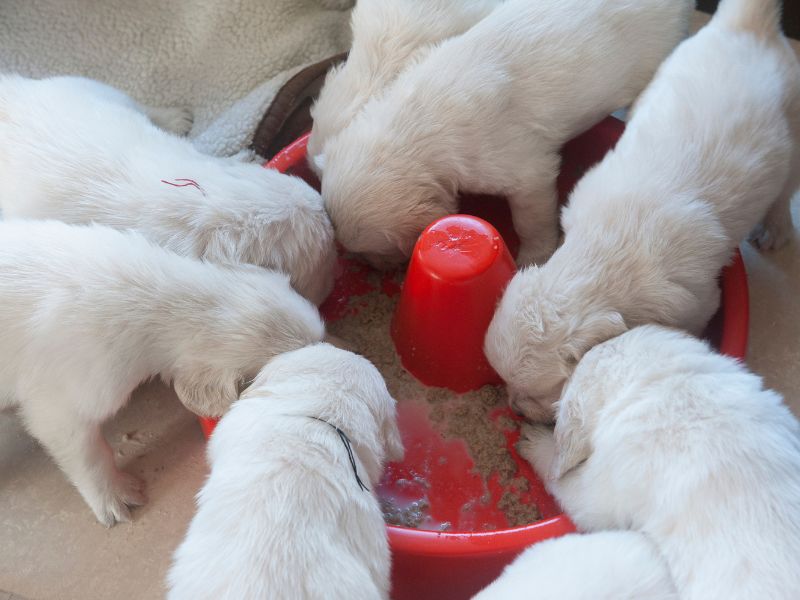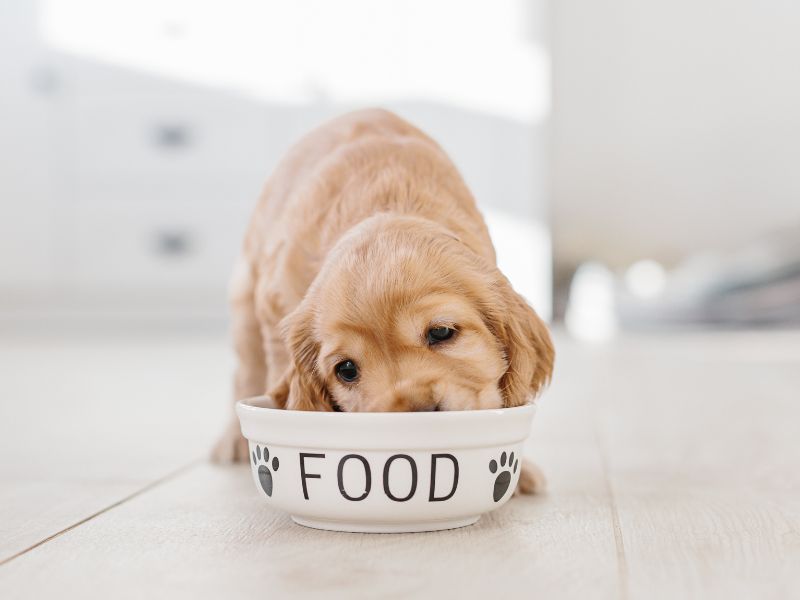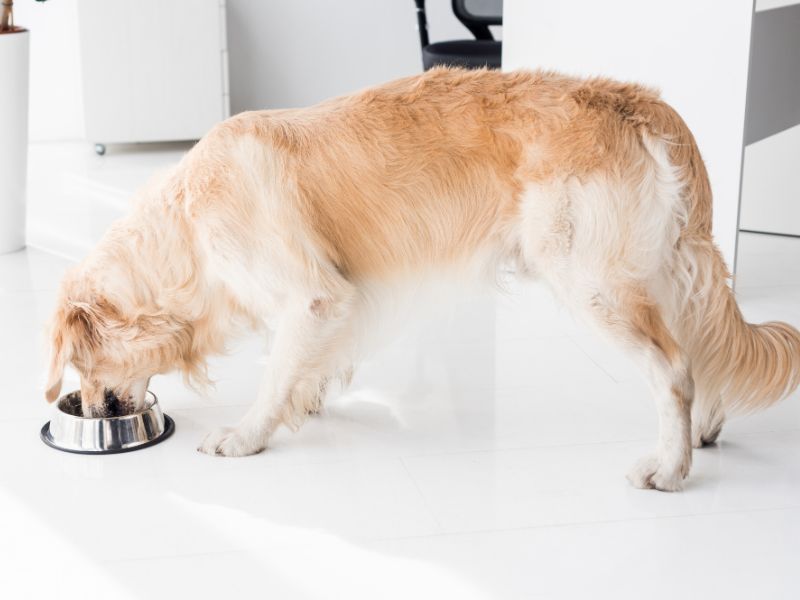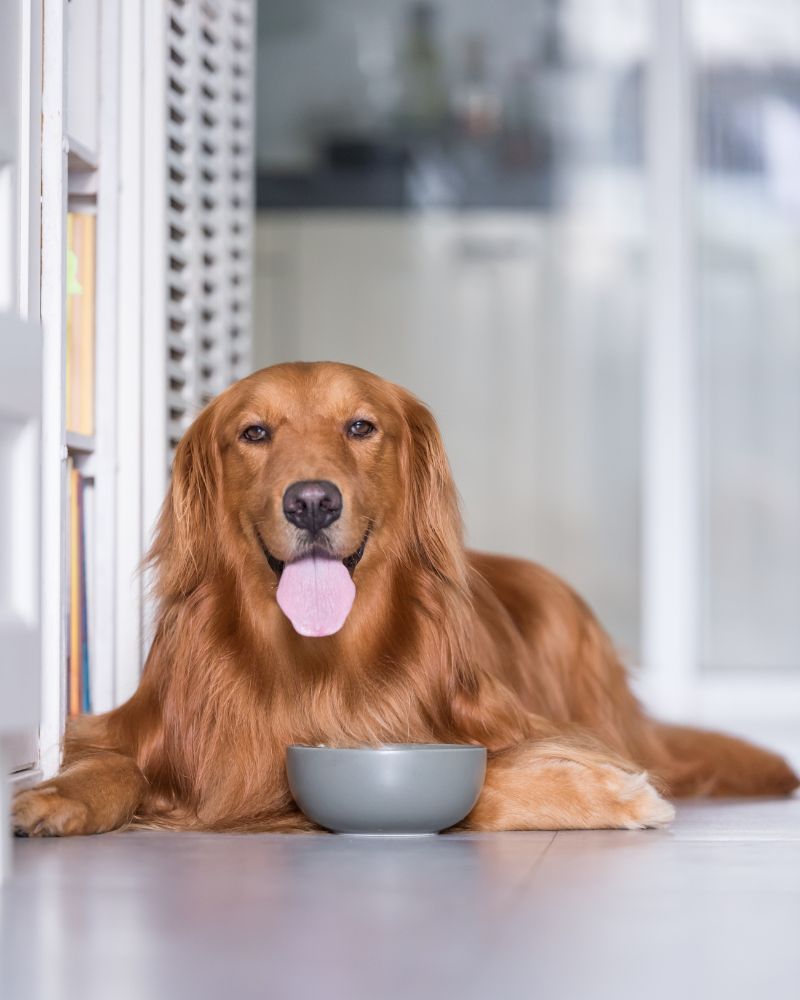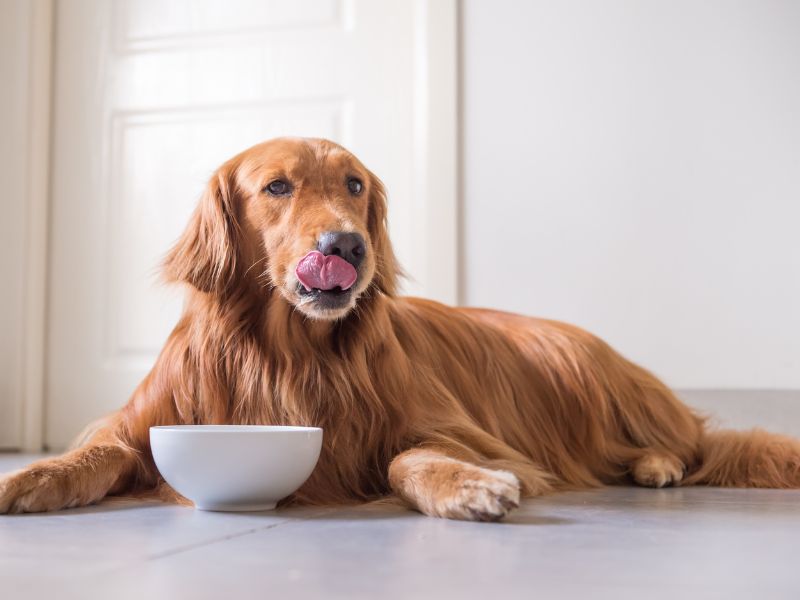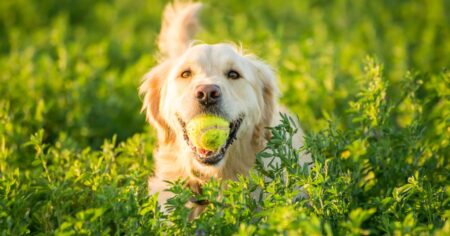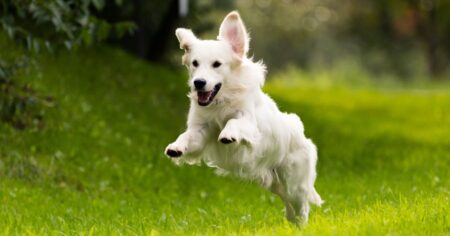Golden Retriever puppies are one of the cutest and most adorable creatures on the planet. But as cute as they are, they require a lot of attention and care, especially when it comes to their diet. Feeding them the right food is crucial for their growth and development, and it can also help prevent health problems in the future.
When it comes to choosing the right food for your golden retriever puppy, there are a few things to consider. First, you need to look for a food that is specifically formulated for puppies. Puppies have different nutritional needs than adult dogs, and their food should reflect that. Second, you should look for a food that is made with high-quality ingredients. This will ensure that your puppy is getting all the necessary nutrients they need to grow and thrive. Finally, you should look for a food that is easy to digest. Golden retrievers are prone to digestive issues, so finding a food that is easy on their stomach is important.
There are many different types of puppy food available on the market, so it can be overwhelming to choose the right one for your golden retriever. However, with a little research and some help from your veterinarian, you can find the perfect food to meet your puppy’s nutritional needs. In the following sections, we will explore some of the best puppy foods for golden retrievers and provide tips on how to choose the right one for your furry friend.
Most Popular Food For Golden Retriever Puppies
Golden Retriever puppies are adorable, and they require a healthy diet to grow up strong and healthy. The most popular food for Golden Retriever puppies is Purina ProPlan Large Breed Puppy Food. It is a complete and balanced meal that provides all the necessary nutrients for your puppy’s growth and development.
Another popular choice for Golden Retriever puppies is Royal Canin Golden Retriever Puppy Food. This food is specially formulated to meet the nutritional needs of Golden Retriever puppies. It contains a blend of antioxidants, vitamins, and minerals that support your puppy’s immune system and promote healthy skin and coat.
When choosing a food for your Golden Retriever puppy, it is important to consider the ingredients. Look for high-quality protein sources like chicken, lamb, or fish. Avoid foods that contain fillers like corn, wheat, and soy, as these can cause digestive issues and allergies.
It is also important to consider the size of the kibble. Golden Retriever puppies have small mouths, so they need a food with small-sized kibble that is easy to chew and swallow. Additionally, you should feed your puppy three to four small meals a day to prevent overeating and obesity.
Overall, Purina ProPlan Large Breed Puppy Food and Royal Canin Golden Retriever Puppy Food are the most popular choices for Golden Retriever puppies. However, it is important to consult with a veterinarian to determine the best food for your puppy based on their individual needs and health conditions.
The Dangers Of BEG And Grain-Free Diets
Grain-free diets have become increasingly popular in recent years, with many dog owners believing that they are healthier for their pets. However, there is growing concern among veterinarians and animal nutrition experts that these diets may be putting dogs at risk of serious health problems.
Recent studies have suggested a link between grain-free diets and a potentially life-threatening heart condition called dilated cardiomyopathy (DCM). This condition is characterized by an enlarged heart that is unable to pump blood effectively, leading to a range of symptoms including fatigue, weakness, and difficulty breathing.
One study published in the Journal of the American Veterinary Medical Association found that Golden Retrievers fed a grain-free diet were at a significantly higher risk of developing DCM than those fed a diet containing grains. The study also suggested that boutique diets (those made by small companies with unusual or exotic ingredients) were particularly problematic.
The exact cause of the link between grain-free diets and DCM is not yet fully understood. However, some experts believe that it may be related to a deficiency of taurine, an amino acid that is essential for heart health. Taurine is found in high concentrations in meat, which is a key component of many grain-free diets. However, some of these diets may not contain enough taurine to meet a dog’s needs, particularly if they are also low in other key nutrients.
In conclusion, while grain-free diets may seem like a healthy choice for dogs, there is growing evidence to suggest that they may be putting pets at risk of serious health problems. Dog owners should talk to their veterinarian about the best diet for their pet, taking into account their individual needs and any underlying health conditions.
Why You Should Feed Your Golden Retriever Puppy High-Quality Food
Golden Retriever puppies are adorable bundles of energy that require proper nutrition to grow up healthy and strong. Feeding them high-quality food is essential to ensure they receive the necessary nutrients for optimal growth and development. Here are some reasons why you should consider feeding your Golden Retriever puppy high-quality food:
What Makes Food High-Quality
High-quality puppy food is formulated to meet the nutritional needs of growing puppies. It contains the right balance of protein, fat, carbohydrates, vitamins, and minerals to support healthy growth and development. It is also free from harmful additives, artificial preservatives, and fillers that can cause health problems in the long run.
Feeding your Golden Retriever puppy high-quality food can provide the following benefits:
- Promotes healthy growth and development: High-quality food contains the right balance of nutrients to support healthy bone and muscle growth, brain development, and immune system function.
- Supports healthy digestion: High-quality food is easy to digest and can help prevent digestive problems such as diarrhea, constipation, and vomiting.
- Improves coat and skin health: High-quality food contains essential fatty acids that can help improve coat and skin health, making your puppy’s coat shiny and soft.
- Boosts energy and vitality: High-quality food provides the necessary energy to support your puppy’s active lifestyle and playful nature.
In summary, feeding your Golden Retriever puppy high-quality food is essential to ensure they grow up healthy and strong. It can provide numerous benefits, including healthy growth and development, improved digestion, better coat and skin health, and increased energy and vitality.
How To Read A Dog Food Label
When it comes to feeding a Golden Retriever puppy, it is important to understand how to read a dog food label. Here are some tips to help you make an informed decision:
Look for the AAFCO Statement
The first thing to look for on a dog food label is the AAFCO statement. This statement indicates that the food meets the minimum nutritional requirements set by the Association of American Feed Control Officials (AAFCO). It is important to choose a food that meets these standards to ensure your puppy is getting the right balance of nutrients.
Check the Ingredients List
The ingredients list is where you can find out what is actually in the food. Ingredients are listed in descending order by weight, so the first few ingredients are the most important. Look for high-quality protein sources, such as chicken, beef, or fish, as the first ingredient.
Understand Guaranteed Analysis
The guaranteed analysis provides information about the nutrient content of the food. It includes the minimum percentages of crude protein and crude fat, as well as the maximum percentages of crude fiber and moisture. Make sure the food meets the minimum requirements for protein and fat, and that the fiber and moisture levels are appropriate for your puppy’s needs.
Look for Additional Information
Some dog food labels may include additional information, such as feeding guidelines or a calorie count. This information can be helpful in determining how much to feed your puppy and ensuring they are getting the right amount of calories.
By understanding how to read a dog food label, you can make an informed decision about what to feed your Golden Retriever puppy. Always choose a high-quality food that meets the AAFCO standards and provides the right balance of nutrients for your puppy’s needs.
Golden Retriever Food-Related Health Issues
Golden Retrievers are prone to certain health issues that can be related to their diet. One of the most common health problems is obesity. This can lead to joint problems, diabetes, and other health issues. Therefore, it is important to feed your Golden Retriever puppy a balanced and nutritious diet.
Another issue that can arise from a poor diet is allergies. Golden Retrievers are prone to food allergies, which can cause skin problems, itching, and digestive issues. It is important to choose a high-quality puppy food that is free from common allergens such as corn, wheat, and soy.
Golden Retrievers are also prone to hip dysplasia, which is a genetic condition that affects the hip joint. A diet high in protein and calcium can exacerbate this condition. Therefore, it is important to choose a puppy food that is specifically formulated for large breed puppies.
Feeding your Golden Retriever puppy a balanced and nutritious diet is essential for their health and wellbeing. It is important to choose a high-quality puppy food that is free from common allergens and specifically formulated for large breed puppies.
How Much And When Should You Feed Your Golden Retriever Puppy
Golden Retriever puppies require a balanced diet to grow up healthy and strong. It is essential to feed them the right amount of food at the right time. Here are some guidelines on how much and when to feed your Golden Retriever puppy.
Frequency
Golden Retriever puppies should be fed three to four times a day until they are six months old. After six months, you can reduce the frequency to two times a day. It is important to feed them at scheduled intervals to maintain their digestive health.
Quantity
The amount of food your Golden Retriever puppy needs depends on their age, weight, and activity level. As a general rule, an 8-week old Golden Retriever puppy should eat about 1.5 cups of food a day. By 4 months, they should be eating 3 cups of food, and up to 4 cups around 6 months.
Type of Food
It is important to choose the right type of food for your Golden Retriever puppy. Look for high-quality puppy food that is formulated for their specific nutritional needs. Avoid feeding them table scraps or human food, as this can upset their stomach and lead to health problems.
Treats
Treats can be a great way to reward your Golden Retriever puppy for good behavior, but it is important not to overdo it. Too many treats can lead to weight gain and other health problems. Look for healthy, low-calorie treats that are specifically designed for puppies.
Water
Make sure your Golden Retriever puppy has access to clean, fresh water at all times. Dehydration can lead to health problems, so it is important to encourage your puppy to drink water regularly.
In summary, feeding your Golden Retriever puppy the right amount of food at the right time is essential for their health and well-being. Follow these guidelines to ensure your puppy grows up healthy and strong.
Why You Don’t Want To Overfeed Your Golden Retriever Puppy
Overfeeding a Golden Retriever puppy is not recommended. Puppies have a tendency to eat more than they need, which can lead to obesity and other health problems. It’s important to keep in mind that a puppy’s nutritional needs are different from those of an adult dog.
Giving your puppy too much food can lead to weight gain, which can put extra stress on their joints and bones. This can lead to hip dysplasia and other joint problems later in life. Obesity can also lead to other health problems such as diabetes, heart disease, and respiratory problems.
Feeding your puppy too much can also lead to digestive problems. Puppies have sensitive digestive systems, and overfeeding can cause diarrhea, vomiting, and other digestive issues. This can lead to dehydration, which can be dangerous for puppies.
It’s important to follow the feeding guidelines provided by your veterinarian or the puppy food manufacturer. These guidelines will help ensure that your puppy is getting the right amount of nutrients without overfeeding. It’s also important to avoid giving your puppy table scraps or other human foods, as these can be high in fat and calories.
In summary, overfeeding your Golden Retriever puppy can lead to a variety of health problems. It’s important to follow feeding guidelines and avoid giving your puppy too much food or human food. By providing your puppy with the right nutrition, you can help ensure that they grow up healthy and happy.
What About Feeding Your Golden Retriever A Raw Diet Or Homemade Food?
Feeding your Golden Retriever a raw diet or homemade food can be a great option for those who want to ensure their pup is getting the best possible nutrition. However, it’s important to do your research and consult with a veterinarian before making any major changes to your dog’s diet.
Raw diets typically consist of muscle meat, organ meat, whole or ground bone, raw eggs, and dog-safe fresh fruits and vegetables. While some owners swear by this type of diet, others are hesitant due to concerns about potential bacterial contamination or nutrient imbalances.
Homemade dog food can also be a great option, but it’s important to ensure that the recipe is nutritionally balanced and meets your dog’s specific dietary needs. This can be tricky, and it’s always a good idea to consult with a veterinarian or veterinary nutritionist before starting your pup on a homemade diet.
Overall, while a raw or homemade diet can be a great option for some dogs, it’s important to do your research and consult with a professional to ensure that your pup is getting all the nutrients they need to thrive.
What Are The Differences Between Puppy Food & Adult Food?
When it comes to feeding a Golden Retriever puppy, it’s important to understand the differences between puppy food and adult food. Puppies have different nutritional needs than adult dogs, and feeding them the wrong type of food can lead to health problems.
One of the main differences between puppy food and adult food is the nutrient content. Puppies require more protein, fat, and calories than adult dogs because they are still growing and developing. Puppy food is specially formulated to provide the nutrients that puppies need to support their growth and development.
Another difference between puppy food and adult food is the size of the kibble. Puppies have smaller mouths and teeth than adult dogs, so they need smaller kibble that is easier for them to chew and swallow. Puppy food is designed with smaller kibble sizes to accommodate their needs.
Puppy food also contains higher levels of certain nutrients, such as calcium and phosphorus, to support the development of strong bones and teeth. Adult dogs don’t require as much of these nutrients because their bones and teeth are already fully developed.
In addition, puppy food may contain certain ingredients that are not found in adult food, such as DHA, which is a type of omega-3 fatty acid that is important for brain and eye development. Adult dogs don’t require as much DHA as puppies do because their brains and eyes are already fully developed.
Overall, it’s important to choose the right type of food for your Golden Retriever puppy to ensure that they get the nutrients they need to grow and develop properly. Talk to your veterinarian to determine the best type of food for your puppy based on their age, weight, and overall health.
Do Golden Retriever Puppies Need Vitamins?
Golden Retriever puppies require a well-balanced diet to ensure proper growth and development. While a high-quality commercial dog food can provide all the necessary nutrients, some owners may opt to supplement their puppy’s diet with vitamins. But do Golden Retriever puppies really need vitamins?
In general, if a puppy is eating a complete and balanced diet, they should not require additional vitamin supplements. Commercial dog foods are formulated to meet all of a puppy’s nutritional needs. However, some puppies may have specific health conditions or dietary restrictions that require additional supplementation.
It is important to note that giving a puppy too many vitamins can actually be harmful. Over-supplementation can lead to toxicity and cause health problems. Therefore, it is best to consult with a veterinarian before giving any vitamin supplements to a Golden Retriever puppy.
If a veterinarian recommends vitamin supplements for a puppy, it is important to choose a high-quality product specifically formulated for puppies. Look for supplements that contain vitamins A, D, E, and K, as well as B vitamins. Avoid supplements that contain excessive amounts of any one vitamin.
In summary, Golden Retriever puppies generally do not require vitamin supplements if they are eating a well-balanced diet. However, if a puppy has specific health needs or dietary restrictions, a veterinarian may recommend supplementation. It is important to consult with a veterinarian before giving any vitamin supplements to a puppy to ensure their safety and health.
What We Feed Our Golden Retriever
When it comes to feeding their Golden Retriever puppy, the owners should choose a high-quality puppy food that meets their nutritional requirements. The puppy food should have the right balance of protein, fat, and carbohydrates to support healthy growth and development.
One of the most recommended puppy foods for Golden Retrievers is Purina Pro Plan Large Breed. It is a complete and balanced diet that provides all the essential nutrients that a growing puppy needs. The number one ingredient is chicken, which helps in the development of strong muscles and healthy body functions.
Aside from Purina Pro Plan Large Breed, there are other high-quality puppy foods available in the market that are suitable for Golden Retrievers. Some of these include:
- Royal Canin Golden Retriever Puppy
- Hill’s Science Diet Puppy Large Breed
- Blue Buffalo Life Protection Puppy
It is important to note that the puppy food should be appropriate for the puppy’s age, weight, and activity level. The feeding instructions on the package should be followed to ensure that the puppy is getting the right amount of food.
In addition to high-quality puppy food, it is also important to provide fresh water at all times. The water bowl should be cleaned regularly to prevent bacteria growth. Treats can also be given to the puppy, but they should only be given in moderation and should not make up a significant portion of the puppy’s diet.
Overall, feeding a Golden Retriever puppy requires careful consideration of their nutritional needs. By choosing a high-quality puppy food and providing fresh water and treats in moderation, the puppy will have a healthy and happy start to life.
How To Switch Food Brands
Switching your golden retriever puppy’s food brand can be a tricky process, but it doesn’t have to be stressful. Here are some tips to make the transition as smooth as possible:
- Gradual Transition: Gradually introduce the new food brand over the course of 7-10 days. Start by mixing a small amount of the new food with the old food, gradually increasing the amount of new food while decreasing the old food. This will allow your puppy’s digestive system to adjust to the new food gradually.
- Monitor Your Puppy: During the transition period, keep a close eye on your puppy’s behavior and bowel movements. If you notice any signs of diarrhea or vomiting, slow down the transition process or consult with your vet.
- Stick to Similar Food: When switching food brands, try to choose a new brand that has similar nutritional content to the old brand. This will help minimize any digestive upsets that may occur during the transition.
- Introduce New Brand Slowly: When introducing a new brand, it is important to do so slowly. Start by feeding your puppy a small amount of the new food mixed with the old food, gradually increasing the amount of new food over the course of several days.
- Be Patient: Switching to a new food brand can take time, and it’s important to be patient. It may take a few weeks for your puppy to fully adjust to the new food.
By following these tips, you can help ensure a smooth transition to a new food brand for your golden retriever puppy. Remember to always consult with your vet if you have any concerns or questions about your puppy’s diet.
Feeding Your Golden Retriever Puppy
Feeding a Golden Retriever puppy is an important task that requires attention to detail. Puppies need a balanced diet to grow and develop properly. Here are some tips on how to feed your Golden Retriever puppy:
- Choose high-quality puppy food: Look for puppy food that is specifically formulated for large breed puppies. This type of food contains the right balance of nutrients to support your puppy’s growth and development.
- Feed your puppy on a schedule: Puppies need to eat more frequently than adult dogs. Feed your puppy three to four times a day at scheduled intervals. This will help prevent overeating and promote healthy digestion.
- Measure your puppy’s food: Use a measuring cup to ensure that you are feeding your puppy the right amount of food. Overfeeding can lead to obesity and other health problems.
- Avoid table scraps: Feeding your puppy table scraps can lead to obesity and digestive problems. Stick to puppy food and treats that are designed for your puppy’s nutritional needs.
- Provide fresh water: Your puppy should have access to fresh water at all times. Make sure to change the water regularly to keep it clean.
By following these tips, you can ensure that your Golden Retriever puppy gets the nutrition he or she needs to grow and develop into a healthy adult dog.

